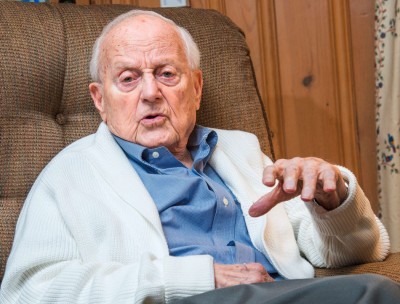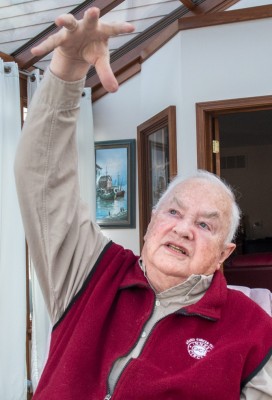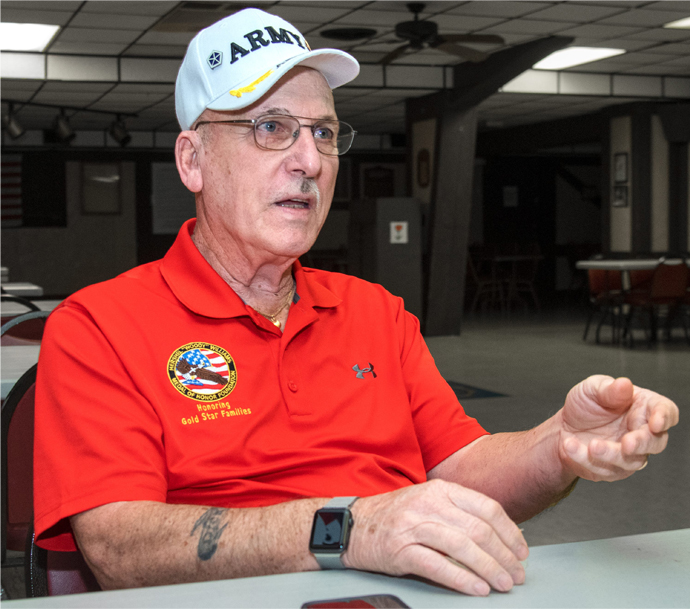David Stangl
By Paul Wood

Photo By Stephen Haas/The News-Gazette
CHAMPAIGN — Whether it was protecting state-of-the-art weaponry or chasing after locals who’d broken through the perimeter fences, it could be intense serving as an Air Force security officer during the Vietnam years.
Staff Sgt. David Stangl, 68, served in the Philippines from 1969 to 1975. For three years, he was at Clark Air Force Base, a Pacific Air Command strategic supply base and fighter-squadron installation — and one of the five largest U.S. bases worldwide at that time, he said.
Stangl, who was recently on an Honor Flight, comes from the Pittsburgh area, and his license plates holder salutes the Penguins. His wife Pat is also a fan.
He enlisted in the Air Force at the height of the Vietnam War, 1969, a year after the Tet Offensive amid the largest contingent of U.S. military personnel during the war.
“I didn’t really know what else I wanted to do,” he said about his employer moving out of state at the time. “I figured I’d let the military pay for my school on the GI Bill.”
At Lackland Air Force Base in Texas, he was trained to be in the Air Police, the Air Force version of MP.
He had also been trained to live off the land in jungle training, which came in handy.
He was sent to the Philippines, ostensibly an ally, but also a home to many communists who supported North Vietnam, he said.
In fact, 1968 saw late-night attacks against American personnel that led to both Clark and nearby Angeles City to be put on curfew.
A year later, when Stangl arrived, the armed force of the Philippines Communist Party began guerrilla attacks.
At Clark, “I was 20 years old, and the base could be pretty loose.” Like Vietnam, 912 miles away across the South China sea, there was a short monsoon season and a dry one.
Air Force police had officers on horses and others working with dogs and running traffic.
“I was an aircraft weapons specialist. One of the things was I guarded our weapons,” he said. “It was under a lot of security. I had a top-secret clearance.”
In fact, he still won’t talk about what kinds of weaponry were being stored for possible use in Vietnam.
Trained in machine gunnery in Nevada, Stangl rotated out to riding patrol on the base’s fences, looking for Filipinos who were trying to break in.
“I rode in Jeeps with the Philippines constabulary. Part of the problem was that some of the Filipinos were really poor and would steal just about anything, even a section of the fence,” Stangl said. “They were also good at hiding.”
Or their motives could be political, he added.
The police had to chase after intruders, sometimes on foot. Other personnel would interrogate them.
“There were a lot of them, some of them living just outside the fence,” Stangl said.
Stangl said he once had to jump out of his vehicle and sprint after one robber.
“You didn’t know how many of them there were. I didn’t know if he had a gun or a knife,” he said. “You just react.”
The intruder was faster, getting away.
The Americans were so unpopular with some groups that an alert went out for Manila students who had threatened to force their way on base.
But after his three years, he was sent to a quiet place — Walla Walla, Wash.
Stangl stayed in the Air Force until 1975 when he was serving in New Mexico.
Still attracted to risky duty, he worked 16 years as a guard in a maximum security prison.
He and Pat moved to Champaign so they could help take care of two of their grandchildren, and have lived here six years.
Do you know a veteran who could share a story about military service? Contact Paul Wood at pwood@news-gazette.com.
Read more stories from local veterans:
 Morris Hecker
CHAMPAIGN — Morris Hecker was bombed and strafed on his LST — an acronym that he jokes stands for “Long, Slow Target.” L …
Morris Hecker
CHAMPAIGN — Morris Hecker was bombed and strafed on his LST — an acronym that he jokes stands for “Long, Slow Target.” L …
 Walter McMahon
CHAMPAIGN — First Lt. Walter McMahon took part in cold, bloody battles in Korea, and left with a Purple Heart — and the …
Walter McMahon
CHAMPAIGN — First Lt. Walter McMahon took part in cold, bloody battles in Korea, and left with a Purple Heart — and the …
 Richard Revell
CHAMPAIGN — In 1955, Richard Revell saw a war movie called “To Hell and Back.” It starred war hero Audie Murphy as himse …
Richard Revell
CHAMPAIGN — In 1955, Richard Revell saw a war movie called “To Hell and Back.” It starred war hero Audie Murphy as himse …